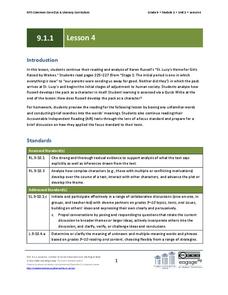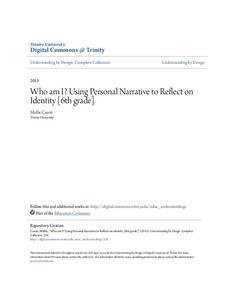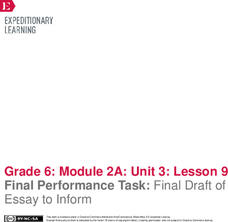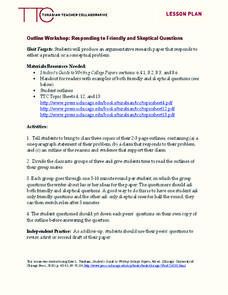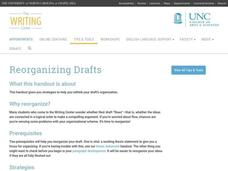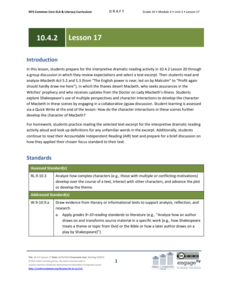EngageNY
Grade 9 ELA Module 1, Unit 1, Lesson 4
Connect with the text using helpful annotation strategies. As your class reads the first section of Karen Russell's short story, "St. Lucy's Home for Girls Raised by Wolves," they note important passages that establish character...
K12 Reader
Alliteration Adventures
Assign a worksheet to reinforce the literary device of alliteration. Scholars choose a letter, brainstorm a variety of nouns, verbs, and adjectives that begin with that letter, then write three sentences using the words they listed.
Teacher Created Resources
Terrific Topic Sentences
Strengthen writing skills with a introductory exercise to learn how to write topic sentences. Using an informational reading passage, pupils delineate the types of sentences they read and discern what the topic sentence should be.
Roald Dahl
Matilda - Throwing the Hammer
Full truth, or an exaggeration? How can you tell when a storyteller is exaggerating a story? Readers analyze a story told by Hortensia, and identify the exaggerative language she uses. Then, learners write their own narrative story using...
Trinity University
Who Am I? Using Personal Narrative to Reflect on Identity
Who am I? Pupils work to answer this question through a unit that explores personal narratives and identity. Exit tickets for activities that examine different poems, short stories, and autobiographical writing serve as prewriting for...
Poetry4kids
Simile and Metaphor Lesson Plan
Similes and metaphors are the focus of a poetry lesson complete with two exercises. Scholars read poetry excerpts, underline comparative phrases, then identify whether it contains a simile or metaphor. They then write five similes and...
Poetry4kids
How to Start a Poetry Journal
Practice makes proficient! Using a journal of their choice, authors organize pages, then begin their writing journey of on-going writing practice in which they compose all poetic forms including diamante, limerick, free verse, and more!
California Education Partners
We Are The Ship
An assessment sheds light on scholars' ability to read, gather evidence, and draft an original written composition. Learners read an informative text twice before taking notes and discussing their thoughts and textual evidence with a...
California Education Partners
Frog and Toad Together by Arnold Lobel
A three-part assessment tests scholars' reading and writing capabilities. Young readers listen to and read an excerpt from Frog and Toad Together by Arnold Lobel. After drawing pictures of what is memorable, learners discuss their notes...
EngageNY
Final Performance Task: Final Draft of Essay to Inform
Sometimes, it's fun to follow the rules. Using their drafts of an evidence-based essay from previous lessons, scholars write their final informative essays about rules to live by. Next, they choose and share quotes from their essays that...
Curated OER
Summer Shorts
Want to use sequence maps in your narrative writing unit? Young writers work to create personal narratives about their summer vacation. They write a narrative of their vacation and create a display using summer clothing shapes made from...
Worksheet Web
Interrogatives and Auxiliary Verbs
Interrogatives—who, what, where, when, why, and how—are the focus of a grammar activity that reinforces writing questions and using auxiliary verbs.
Film English
Everyday
What would you do if you got an extra day every week? Partners share some information about their routines and lives and write compositions about one another based on the information. Each partner tries to guess what the other person...
Reproducible Master
Reader’s Journal
As you read a story or novel, have your class members put together and fill out a journal. They will have the chance to illustrate a cover page, draw and write about various topics, respond to a focus questions, and draft a paragraph.
Turabian Teacher Collaborative
Outline Workshop: Responding to Friendly and Skeptical Questions
Answering questions is the best way to hone and revise your argument. Foster receptive writers with a workshop activity that promotes peer editing and argumentative writing skills. Given lists of both friendly and skeptical questions,...
Curriculum Corner
November Bell Ringers
All things November in a set of 32 bell ringer ideas to get you through the month. From writing about November to writing about colors and feelings in fall, these bell ringers are fun and allow creative writing practice.
University of North Carolina
Reorganizing Drafts
Poor organization often destroys an otherwise good paper. After writing a first draft, individuals consider the organization of ideas, a topic discussed in the 16th handout in the 24-part Writing the Paper series. The resource covers...
University of North Carolina
Qualifiers
A lot of writers really struggle very much with adding a lot of qualifiers and intensifiers in their writing. Part of a larger series to improve writing skills, a handout on the topic provides tips to help reduce a reliance on these...
University of North Carolina
Verb Tenses
Twelve categories of verbs exist in the future tense, ranging from simple present to future perfect progressive, but only three have a place in academic writing. Those three tenses make up the content of an informational handout that...
ETFO
Free Verse Poetry Rubric
Follow poetry instruction with a four-category rubric designed to guide budding poets' writing of free verse poetry.
Little Stones
How Can Poetry Make People Think and Care?
Can beautiful words change the world? Literary scholars discover how to paint their visions of change using poetry in a series of three workshops. Each independent topic gives participants a chance to examine their feelings about...
Poetry4kids
How to Write a Funny Epitaph Poem
What can happen if you eat too much cafeteria food? Or wear dirty clothes every day? Or talk back to your mother? Use a lesson on humorous poems as a way for students to practice silly rhymes as fictional epitaphs.
Poetry4kids
Playing With Your Food Poem Lesson
What's more fun than playing with your food? Writing a poem about it! A quick and straightforward lesson guides young writers through the steps of writing a funny, well-structured poem about combining sports and food.
EngageNY
Grade 10 ELA Module 4: Unit 2, Lesson 17
Madness, violence, despair—the titular character of Shakespeare's Macbeth is spiraling out of control. Pupils first explore the topic with a collaborative jigsaw discussion. At the end of the instructional activity, they write about how...
Other popular searches
- Writing Journals About Art
- Writing and Art
- Writing About Art
- Holiday Writing and Art
- Language Art Writing
- Nature Writing and Art
- Art Writing Peer Review
- Writing Reviews of Art
- Art and Writing Component
- Creative Writing and Art
- Art Writing Prompts
- Writing in Art Class


